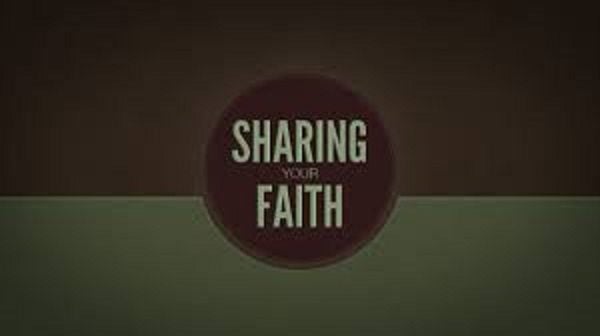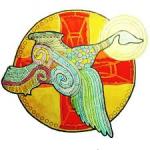During the last seminar of the semester in one of my classes this week, my students and I had a fascinating, wide-ranging conversation about why people (including all of the students present) strongly believe some version of “everything happens for a reason” to be true. Our conversation took me back to various aspects of my youth.
I grew up in the world of evangelical Christianity, and have spent much of my adult life grappling with it, ultimately embracing and being thankful for some of what I carried out of my religious upbringing, while rejecting other parts of it. One of the pieces of this religious world that was most incompatible with my nature was “Evangelization”—the requirement that one “share” (read “force down other people’s throats”) one’s faith.

For an extremely introverted and socially awkward guy who was also naturally inclined to be skeptical of much of what I was supposed to believe as a Christian, the requirement to share my faith was akin to being required to spend a day at school naked. I wasn’t going to do it, but didn’t have the nerve to directly refuse. So on a given Saturday morning when, with our church youth group, I was supposed to hand out Christian literature to unsuspecting and unwilling strangers downtown, I left all of my pile of propaganda in the nearest mailbox. I lied about how many people I had talked to about their eternal soul at the group’s debriefing later in the day. Just about everyone in my little town knew that I was a preacher’s kid; I sure as hell wasn’t going to deliberately talk with anyone about it.
I have spent a great deal of thinking and writing energies—particularly in this blog—exploring and probing these and related matters from my youth over the past several years. I have become comfortable enough in my own faith-skin that I find myself bringing some of these explorations into my classes. Last semester, for instance, in my Philosophy of Knowledge class I happened to describe myself in the middle of one conversation as a “person of faith.” This caught the attention of one of the most vocal and engaged students in the room, a young man who frequently expressed his own disdain for organized religion; he wrote the following in his next intellectual notebook entry:
When you said in class the other day that you were a person of faith I was taken aback. How? How did you get yourself to believe in what you believe? You mentioned that your father was a preacher or priest? Did you have a vision? Did god speak to you? Every time I reach certainty life takes a wrecking ball to it and I wouldn’t have it any other way because to me that is the image of Christ being raised on the cross . . . Why/how are you religious?
I had a brief internal return to a uncomfortable moment as a freshman in college when, despite my best efforts to conceal the awful truth, a friend asked me directly “You’re a Christian, aren’t you?” More than forty years later, I have slightly better answers than “Yeah, but I’m not really that into it” prepared. I wrote back to my student:
Let me say this about being a person of faith. I have often described myself as Novalis described Spinoza, as a “God-obsessed person.” I was born into a religious world and struggled with it from as early as I can remember. But I have never lost the suspicion that there is something greater than us, although I have always resisted the claims to certainty that most traditionally religious persons will give you. If you are waiting for an experience or a logical proof to convince you of the existence of something greater than us, my guess is that you will be disappointed. Or at least I have never experienced a vision, “born-again experience,” or anything similar. I when I say I am a person of faith, that is not synonymous with being religious–not even close.
The evangelicals of my youth are rolling over in their graves at that response, but if the continuing email conversations I have had with this student continuing for several weeks after the end of the course are any indication, my response hit the right note.
I recently read Everything Happens for a Reason: And Other Lies I’ve Loved, a memoir by Kate Bowler, a professor at Duke Divinity School. In her thirties, Bowler was living the life, with her dream job teaching at her alma mater, married to her childhood sweetheart, and the new mother of their first child. And then she is diagnosed with advanced colon cancer and possibly only months to live. Her book is a brutally honest, sometimes hilarious, sometimes sad, always insightful first-person exploration of faith under pressure. Some her memoir resonates strongly with what I have learned over the years about lived faith.
After a New York Times op-ed that she wrote about living with cancer and the likelihood of impending death, an essay that served as the basis for her book, Bowler received thousands of emails and pieces of mail from well-meaning persons who all believed that they had “the answer” for her struggles, usually accompanied by platitudes such as “everything happens for a reason” and “God is in control.” Many of these “answers” came from assumptions of certainty that Bowler found not only unhelpful, but also inhuman. She writes that “there is a trite cruelty in the logic of the perfectly certain.” That is true about virtually everything we think we know with certainty, particularly about what is greater than us.
Bowler reports that whatever reality God has for her in the midst of pain, suffering, and hope has nothing to do with doctrine, dogma, or certainty. God shows up in the strangest places, such in an inexplicable, almost mystical peace that arrived in the middle of the worst of times. She worries that this abiding peace will not last—and it doesn’t. Yet something remains . . .
There will be no lasting proof that God exists. There will be no formula for how to get it back . . . When the feelings recede like the tide, they will leave an imprint. I would somehow be marked by the presence of an unbidden God.
When asked to provide evidence that God is real, that faith matters, I frequently fall back on the story of the once-blind man in the gospels who is challenged to respond to the charge that the man who healed him is a sinner: “Whether he is a sinner or not, I do not know. But this I do know—I was blind, and now I see.” Faith is radically individual and stubbornly resistant to generalization or formulaic reduction. As Kate Bowler writes,
That is the problem with formulas—they are generic. But there is nothing generic about a human life. There is no life in general. God may be universal, but I am not.












